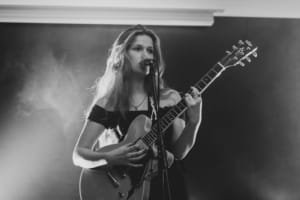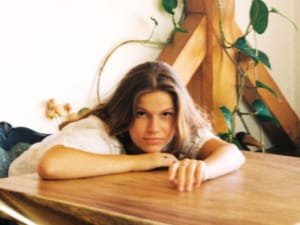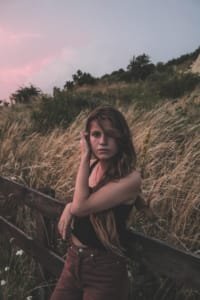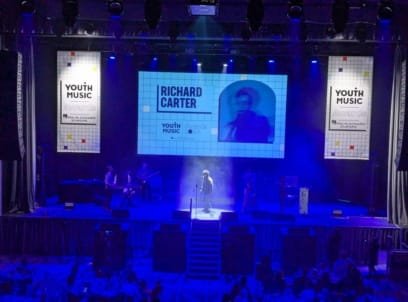She likes jazz and pop, happy melody and sad lyrics, city life and forests – the life of Tamara Kramar (22) is full of contrasts, yet she embraces their beauty, even in her music. Through the mix of neo-soul and pop, Tamara brings us a refreshing blend of old-school and contemporary music.
It all started during the pandemic – Tamara was sitting in her bedroom in Brighton when something just sparked, and she knew a song had to be written.
Since then, Tamara has successfully released her debut single ‘So Sweet’ (2021), followed by ‘Hey Pretty Girl’ (2022), which premiered on BBC Radio Introducing, becoming the song of the day. At the beginning of a promising musical journey, the young musician of Slovak origin had already won the Radio_FM’s Discovery of the Year award in Slovakia (2022) and completed her Bachelors in Neuroscience and Cognitive Science at the University of Sussex.
In an interview for True Cadence, Tamara unravels how she develops her musical identity by experimenting with her music style and songwriting. With an honest, relaxed attitude, Tamara confesses her love for musical contrasts, explains how her neuroscience studies helped her understand emotions evoked by music, and hints at the diverse musical genres and topics explored in her upcoming EP.
You’ve always considered music as your hobby, but now you’re on your way to becoming a successful musician. What is it that keeps drawing you towards music?
That’s a good question. I started with music when I was seven and was forced into it by my parents. For a few years, I hated it. But then, when I discovered that you could learn songs you liked to listen to, I fell in love with it. And then performing made me love it even more, the feedback you get from people, and just being in a room with people where you can perform, and then they give you something back. It wasn’t until I moved to Brighton that I started performing at open mics every week, and I got addicted to it. And now I just love it.

Your music combines neo-soul with modern pop, an interesting mix of the old and new genres. Do you listen to more old or contemporary music?
I like both. I love to be inspired by older music because if we bring something back from the past, it feels fresh again. But at the same time, new music is so inspirational as well. I love listening to what’s being made now, to know where we are. So, I would say both, really, but when I like an artist who is active now, I love to go and see what in the past inspired them, go back to their roots as well.
Back to your roots, what music did you grow up on?
I was always drawn to Black music, Soul, and Blues. I don’t know why, but I always found that satisfying – anyone from Ella Fitzgerald, Etta James, Donny Hathaway, Erykah Badu, from the 90s D’Angelo and even Hip Hop like Outcast and A Tribe Called Quest. It’s got this groove to it that I love. Jazz, I absolutely admire. It’s a whole thing on its own. My uncle is a jazz musician, so maybe that was an influence as well. But I love pop. Because pop means popular. Right? So, it’s what the majority are meant to like. I guess that’s just easy on the ears.
A lot of the songs I like are upbeat, and you want to dance, but it’s actually quite sad. And there’s a cool contrast because, a lot of the time, emotions are not black and white. You might feel it all at the same time.
You have just gained a degree in Neuroscience. Do you apply this knowledge to understand people’s behaviour in your songs?
It definitely shaped how I see us as people and how I analyze people’s behaviours and things. So then, if I think about songs, it probably is influenced by it. What always fascinated me were preferences. Why do I like this type of music, and someone else likes that type of music? Why do I get excited when I hear this song, but someone else would call it boring? My whole dissertation was about music and music perception because I was just like, well, you know, here I am pretending to be a neuroscientist and a musician. How do I combine them? (laughs)
What is your creative process like? Do you have a routine or rituals that help you?
I always write with my guitar. I usually find some chords first, and melodies and then lyrics come after that. Or I have random sentences on my phone that are like word combinations. But yeah, it’s all over the place. I don’t have a specific routine quite yet. Just like I don’t have a specific sound just yet. When it comes to my music, I’m still experimenting with what my music is and should be like, same with songwriting. I don’t have a strict way about it.

Your debut single, ‘So Sweet’, combines happy, uplifting music with bitter lyrics. Why did you choose to go for this contrast?
I just like it. A lot of the songs I like are really upbeat, even funky, and you want to dance, but it’s actually quite sad. And there’s a cool contrast because, a lot of the time, emotions are not black and white. You might feel it all at the same time. Obviously, I love a sad song that is slow and just makes you cry. And I love a happy song that’s fast and upbeat and has lyrics like ‘Don’t worry, be happy’. But I do find it interesting when those two are combined.
I don’t think people should focus on satisfying the audience because that quickly becomes quite dangerous when you just try to satisfy someone forever.
I think it’s maybe a bit unpredictable. And that makes it interesting. When you hear the intro of ‘So Sweet’, it’s a happy melody. And you might imagine, like, a summery scene with flowers. But then the lyrics start reminiscing and being a bit sad about something that doesn’t exist anymore. And it’s just unexpected, which makes you interested. That is what we learned about as you have some expectations. And when they’re not met, you’re like, wait, what is it? It’s not like I was thinking about this while writing the song, but I think that is why I like it in songs.
As a Slovak musician based in Brighton, you have concerts both in the UK and Slovakia. How do you manage to satisfy both audiences?
I don’t think people should focus on satisfying the audience because that quickly becomes quite dangerous when you just try to satisfy someone forever. And then, you can be disappointed. So, I always just try to do me, and people that resonate with it will come through, and people that don’t just won’t, so that’s how I like to see it.
Back home [Slovakia], more people know about me. It’s a bit further because people might know my songs, and sometimes they sing along, which is incredible. Whereas here [England], it’s always a risk putting a show on like, you know who’s gonna show up? But, at the same time, it gives you a benefit because you can surprise people. So, it’s quite different.

If you could collaborate with any artist or musician, who would you pick and why?
There are so many artists in the UK now that I absolutely love, and they’re my age. They’re like, in their 20s – Eloise, Olivia Dean, Matilda Mann. But then, you know, anyone bigger as well? Anderson .Paak, Bruno Mars. They’re so professional. I would love to see how they work.
Some say that people should be consistent, but I always admired a well-established musician who could make an album in one style, but then the next album is completely different.
What can you tell us about your upcoming EP?
Well, we have a new song coming out in the next few months. There are going to be five songs in total. When I started working on it, I did not intend to make an EP or even be a recording musician. It just began with some songs I wrote in my bedroom, so each song came about quite differently. ‘So Sweet’ was reminiscing on some love, ‘Hey, pretty girl’ is me making fun of society. There’s one more we already play live in the shows, called ‘Mirror talk’. It’s about me realizing that I’m very clever when I give advice to other people, but I cannot listen to my own self. So, yeah, it’s a very personal project.
As you’re still finding your musical expression, can we expect each song on your EP to have a slightly different style?
Definitely! Some of them will be produced by the same person, which unites them, but they will be all very different, even style-wise. Some criticize it and say that people should be consistent. And I understand, but I always admired it, even in a well-established musician who could make an album in one style, but then the next album, five years later, is completely different. I’m like, how cool is it that you can make whatever you want? I don’t think it’s probably marketing-wise and business-wise; it’s better to have an identity and stick to one sound. But I think it’s admirable when someone can do loads of different things.
If you could be a song, which song would you be?
Wow. I think I’m gonna say ‘Certainly’ by Erykah Badu, but the live version. It starts a certain way, at a certain tempo, and then, halfway through, it completely stops. And they speed it up. There’s a melody change, and there’s a rhythm change. And it’s really long. But it’s so fun to listen to. And it evolves, and it changes, and it’s alive. So probably that’s life; it’s got a story.
What upcoming concerts and artistic collaborations can we expect?
I’ll be in Slovakia the whole summer, playing gigs all around and at many festivals. And then, I’m coming back at the end of August to play a gig in Brighton, which I’m really excited about because I’m opening for this other incredible artist, her name is Kymara, and I absolutely love her. And then, I am now considering doing a Masters in music production.
What is the best musical advice that really stuck with you?
I would say just enjoy it. Like, do whatever you enjoy. Because, you know, you could say, make as much music as you can, but then that’s pressure. Or you could say, make the best music you can. That’s pressure. So, maybe just enjoy it. If you enjoy it, then keep doing it. Because then you can play gigs for absolutely no one. Just have a good time with it. And also, work with people. That is good advice that I received. Work with many people because everybody can give you something. And it’s just really, really nice to collaborate. It definitely takes time. But even a bad experience is a good experience in the end.
…
Every beginning or experienced musician undergoes a process of self-discovery. One’s identity constantly shifts, and so does one’s music taste. Tamara’s musical journey embraces the message that it is okay not to know what your music style is – what matters is staying true to oneself and reflecting on your experiences and attitudes as they shift and evolve.


